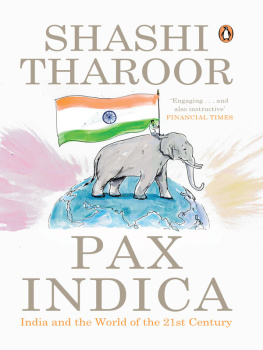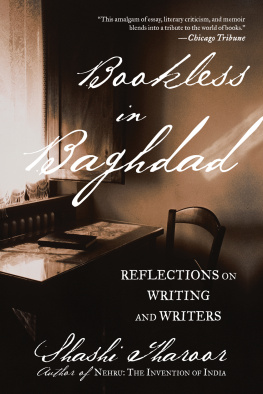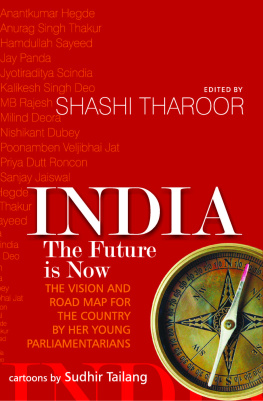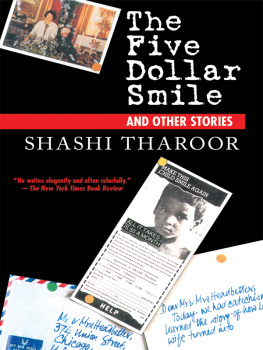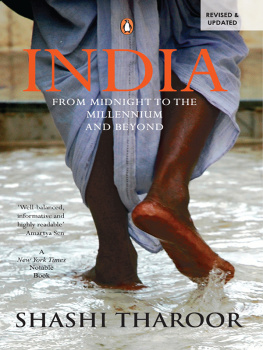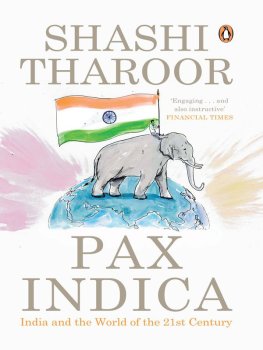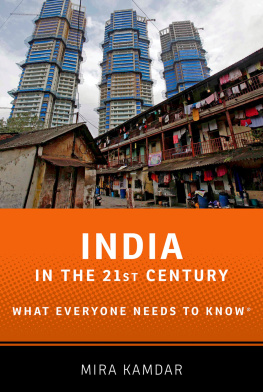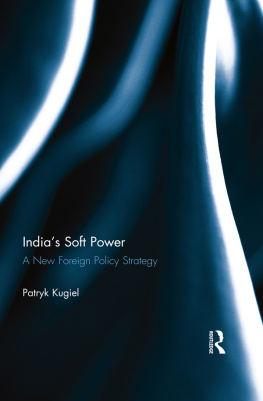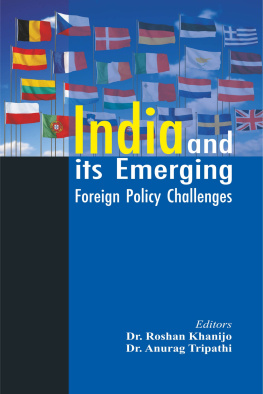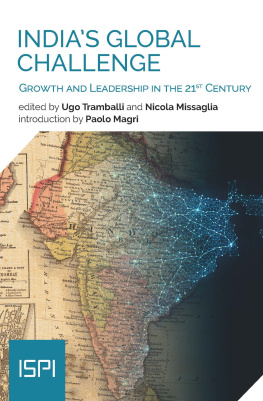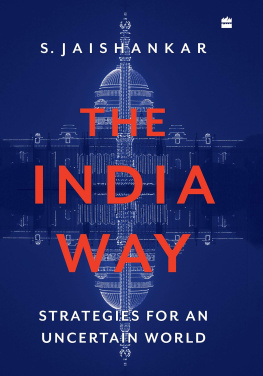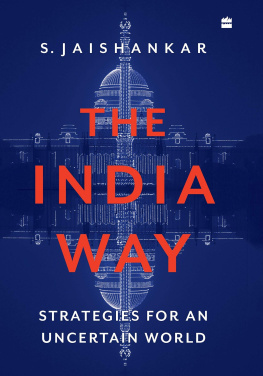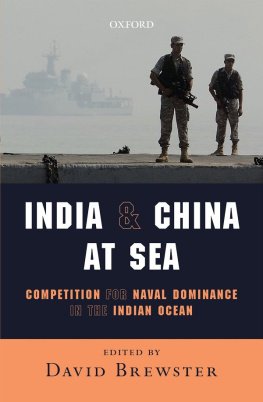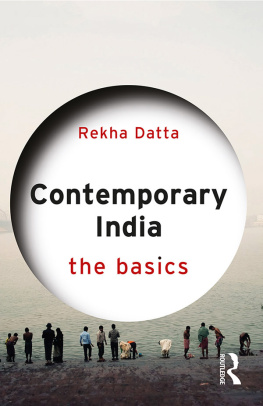PENGUIN BOOKS
UK | Canada | Ireland | Australia
New Zealand | India | South Africa
Penguin Books is part of the Penguin Random House group of companies whose addresses can be found at global.penguinrandomhouse.com.
This collection published 2011
Copyright Shashi Tharoor, 2012
The moral right of the author has been asserted
ISBN: 978-0-143-42018-7
This digital edition published in 2013.
e-ISBN: 978-8-184-75693-7
Not for sale in the US and UK
This book is sold subject to the condition that it shall not, by way of trade or otherwise, be lent, resold, hired out, or otherwise circulated without the publishers prior consent in any form of binding or cover other than that in which it is published and without a similar condition including this condition being imposed on the subsequent purchaser.
PENGUIN BOOKS
PAX INDICA
An elected Member of Parliament, former minister of state for external affairs and former under-secretary-general of the United Nations, Shashi Tharoor is the prize-winning author of twelve previous books, both fiction and non-fiction. A widely published critic, commentator and columnist, he served the United Nations during a twenty-nine-year career in refugee work and peacekeeping, at the Secretary-Generals office and heading communications and public information. In 2006 he was Indias candidate to succeed Kofi Annan as UN Secretary-General, and emerged a strong second out of seven contenders. He has won Indias highest honour for overseas Indians, the Pravasi Bharatiya Samman, and numerous literary awards, including a Commonwealth Writers Prize.
For more on Shashi Tharoor, please see www.tharoor.in.
Those dreams are for India, but they are also for the worldJawaharlal Nehru, Tryst with destiny speech, 15 August 1947
As a major power India can and must play a role in helping shape the global order. The international system of the twenty-first century, with its networked partnerships, will need to renegotiate its rules of the road; India is well qualified to help write those rules and define the norms that will guide tomorrows world. That is what I have called Pax Indica: not global or regional domination along the lines of a Pax Romana or a Pax Britannica but a Pax for the twenty-first century, a peace system which will help promote and maintain a period of cooperative coexistence in its region and across the world.
Praise for the Book
Pax Indica is a great introduction for those interested in reading about Indias foreign policy and its evolution since independenceDNA
[Tharoors] view of the world and Indias role in it is hearteningly sane; he has a diplomats faith in dialogue and cooperation effecting incremental benefitsTehelka
A remarkable survey of Indias international interests, covering enormous ground... Whatever your own views, Pax Indica will enlarge your understanding, and encourage more attention to our still hesitant and unsure engagement with the worldK.S. Bajpai
A comprehensive dissertation on the diverse fields of Indias endeavours since Independence... a timely book, very well written, a must-read for students and professionals alikeJaswant Singh
This exceptionally lively and well-written survey of Indias international relations challenges preconceptions that foreign policy must be dullDavid Malone
Chapter One
Revisiting the Tryst with Destiny
At midnight on 15 August 1947, independent India was born as its first prime minister, Jawaharlal Nehru, proclaimed a tryst with destinya moment which comes but rarely in history, when we pass from the old to the new, when an age ends and when the soul of a nation, long suppressed, finds utterance. It was an hour of darkness, too, with the flames of Partition blazing across the land, hundreds of thousands being butchered in sectarian savagery and millions seeking refuge across the arbitrary lines that had vivisected their homelands. Yet in the midst of these horrors, mingled with the joy of that sublime moment when, in Nehrus memorable words, India awoke to life and freedom, our prime minister remained conscious of his countrys international obligations. In his historic speech about Indias tryst with destiny, Nehru, speaking of his countrys dreams, said: Those dreams are for India, but they are also for the world, for all the nations and peoples are too closely knit together today for any one of them to imagine that it can live apart. Peace has been said to be indivisible; so is freedom, so is prosperity now, and so also is disaster in this One World that can no longer be split into isolated fragments. It was typical of that great nationalist that, at a time when the fires of Partition were blazing across the land, he thought not only of India, but of the world.
In a sense, this was not entirely surprising, because India had, for millennia, been engaged with the rest of the world. The north of India had witnessed a series of visitations and invasions, ranging from armed hordes of Macedonians, Scythians, Persians and Central Asians marching in through the north-west in quest of pillage and plunder to learned Chinese scholars crossing the Himalayas in the north and north-east in quest of learning and wisdom. The South, with its long coastlines, had enjoyed trade relations with the Roman Empire, the Arab lands to the west and the east coast of Africa, while extending its religious and cultural influence to the Asian countries to the east. Historical records and archaeological excavations demonstrate that Indias connections with the rest of the world go at least as far back as the Harappan civilization of 25001500 BC , which maintained extensive links with Mesopotamia. Europes history of trading relations with India is borne out in the writings of the ancient historians Herodotus, Pliny, Petronius and Ptolemy, and long precedes the colonial experience. The naval expansionism of the southern Chola and Pallava empires took Indian influences directly to Thailand, Malaya, Indonesia and Cambodia. Later, the Mughal Empire served as the centre of an Indo-Persian world that straddled both the Bay of Bengal and the Arabian Sea, and whose influence stretched east as well as westso that Thai kings named themselves after Deccani sultans and the first epic poet of Aceh (in Sumatra) was born in Surat (in Gujarat). It could indeed be argued that the India of today is the direct product of millennia of contact, trade, immigration and interaction with the rest of the world. Nehru was thus speaking as heir to this history.
Yet for two centuries before that moment, India had been unable to express its voice or exercise its place in the world. The British had usurped that right from it; when India, under colonial rule, was made a founding member of the League of Nations after the First World War, its delegation was headed by a former England cricket captain, C.B. Fry. Those who spoke for India in the world did so with Britains interests uppermost in their minds. Indias authentic voice had only been heard in those international conferences of subaltern groups where nationalists like Jawaharlal Nehru spoke for his oppressed and excluded people, or in the resolutions passed annually by the Indian National Congress on the international situationresolutions which had no discernible effect on the decision-makers in London who determined where India would stand in world affairs.

